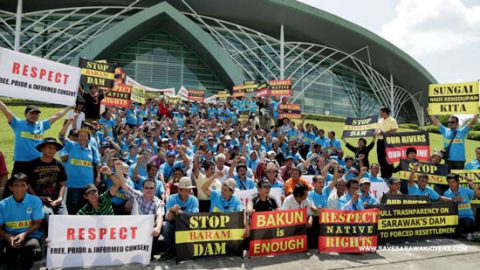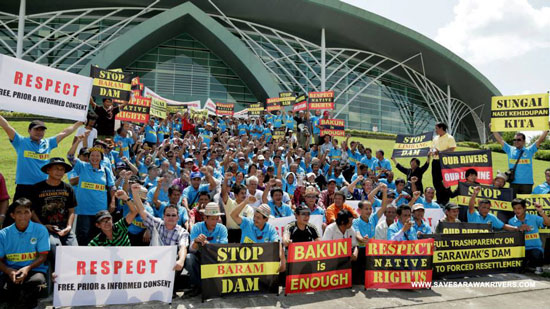
Save Rivers demonstration/ Save Rivers
Marian Willuhn
Protests paid out for indigenous peoples in Borneo
A two year battle on the Malaysian island resulted in the return of the land to its rightful owners.
The indigenous peoples of the Sarawak State on the island of Borneo in Malaysia can finally rejoice after the government of Malaysia would finally give in and scrap plans to build the Baram Dam that would flood villages, cemeteries, spiritual sites and thousands of square kilometres of rain forest.
The dam has been in the focus of international NGO’s and media because of its severe impact on indigenous cultural life and allegations regarding corruption. According to some media Malaysia’s dam plans in the region would produce a total of 7000MW while the projected demand is unlikely to surpass 1500MW.
The region is home to over 40 different indigenous peoples, but Malaysia’s surge to keep up with the economic pace of globalisation, left only 11% of the islands rain forest intact. The palm oil industry, logging and previous dam projects have significantly altered the face of the land these peoples. The Malaysian government, which had previously disregarded the land rights of native peoples, issued a gazette in 2013 stating that the land to be flooded for the dam does not belong the native peoples who raise concerns over resettlement and destruction of cultural heritage.
In fear that the dam would be built against the protest of the villagers, they decided to occupy a preliminary construction site and roads leading to the construction site. These blockades successfully halted the construction of the dam for two years.
After elections the new minister in charge called in a moratorium to officially pause the project for reconciliation. The villagers, however, did not give up the blockades out of the suspicion that the government would commence building as soon as the blockades were dismantled.
In a statement from the 21.03.2016 the government revoked the gazette disowning the native peoples and officially scraping the dam plans.
The local NGO Save Rivers, showed itself happy about the announcement, but also reiterated that they are still waiting for a black and white letter confirmation of the cessation of the projects.
Chief Minister Adenan announced that under his administration all mega dam projects in the region will be halted and carefully reviewed inclusively with the local population. In general he will shift the trend to small micro dams which are much more sustainable for the environment and make economically more sense for the rural populations.

